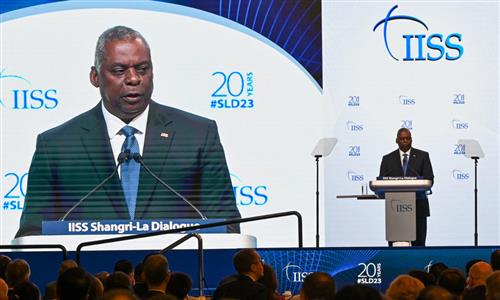Washington 'will not flinch in the face of bullying?' This is absurd: Global Times editorial

US Defense Secretary Lloyd Austin attends the Shangri-La Dialogue summit in Singapore on June 11, 2022. Photo: VCG
The speech delivered by US Secretary of Defense Lloyd Austin at the Shangri-La Dialogue has garnered vastly different reactions from various countries. Several American media outlets singled out Austin's statement, "We [Washington] will not flinch in the face of bullying or coercion [from China]," as the main focus of their reporting. However, this has raised serious doubts among Chinese people on whether Austin took the wrong speech, as reversing the reference to "Washington" and "China" would be more factually accurate. Do Washington politicians misunderstand the words "bullying" and "coercion"? The issue is not so simple.
In his speech, Austin mentioned "bullying" three times and "coercion" five times, either indirectly or directly pointing them all toward China. He also acknowledged that "all of this is especially important in the Taiwan Straits," which exposed the dark intentions of the US side. After Washington hyped up "China's economic coercion," it has replicated the same approach in the military, geopolitical, and diplomatic domains, and now added the term "bullying" to the mix. Although it seems absurd to Chinese people and foreigners with a certain understanding of the realities in the Asia-Pacific region to apply the words "coercion" and especially "bullying" to China's diplomacy, we cannot ignore the US' deliberate and calculated efforts, as these words have been constantly repeated and emphasized in various international public occasions recently.
Washington cannot be unaware of the meaning of "bullying" and "coercion." The term "coercive diplomacy," for example, was originally proposed by American professors to summarize US policies toward Laos, Cuba, and Vietnam at the time. However, to this day, the US has not only stopped, but has instead found new ways and expanded into various areas to engage in bullying and coercion. Which country, including US allies in the region such as Japan and South Korea, has not been subjected to some form of pressure or coercion from the US in areas such as semiconductors, industrial chain relocation, and even trade?
Now the US is distorting concepts and upgrading its rhetoric, conveniently ignoring its own acts of bullying and coercion while turning around and labeling China as the "bully" or "coercer." This is an attempt to exploit its dominance in discourse and muddy the waters. In the complex reality of international relations, there exists a significant area of cognitive ambiguity, where there are many people who lack understanding and judgment of the actual situation, and countries with delicate mindsets due to territorial or other disputes with China. The US aims to seize this area and these individuals and countries and make them the primary targets of its misleading and instigating efforts.
The portrayal of China as a "bully" or "coercer" is primarily aimed at facilitating US' intervention in Asia-Pacific affairs, including the Taiwan question, which is entirely China's internal affair. Moreover, it may serve to partially divert the international community's genuine discontent with US "bullying" and "coercion." We in Beijing clearly see through Washington's calculations, but it cannot be ruled out that there are some people in the international community who are either confused or pretending to be so.
This is a battle of cognition, and it is necessary for the international community to establish consensus on some basic principles and concepts in order to counter US' distortion of right and wrong. As US' biggest adversary in this cognitive battle, China must organize its defense and counterattack with great patience and wisdom. Otherwise, the world may truly be disrupted by the US, as some foundational elements are being shaken by its actions.
For example, in the case of "bullying" and "coercion" this time, it must be clearly distinguished that China's national reunification has nothing to do with the so-called "bullying." It is the interference by the US that constitutes true "bullying" against the entire Chinese nation. When it comes to safeguarding national sovereignty and territorial integrity, China has no room for compromise or concessions. There is no "bullying" or "coercion," only the principles upheld and the interests defended by China.
China has clearly drawn these red lines many years ago. The US insists on crossing these red lines and even encourages other countries to do so. However, when China takes defensive measures and counterattacks, it is portrayed as "bullying" or "coercion." Does China have to stand still and endure the US' insults and attacks? Is the US the only one allowed to bully, while China can only be bullied? This has been absolutely impossible since the establishment of the People's Republic of China.
In his speech, Austin wanted to portray a future vision for the region without coercion, intimidation or bullying. However, he forgot that Washington itself should engage in self-reflection if it truly desires to realize this vision. Without Washington's bullying, coercion, and intimidation, regional countries would not have been forcibly divided into those within the American sphere of influence and those outside of it, nor would they have been driven to confront each other in order to uphold American hegemonic interests. Asians are capable of being masters of their own region.
Finally, it is important to emphasize that when Americans say, "We will not flinch in the face of bullying and coercion," it is not only ridiculous but also chilling. It is like a muscular bully with a face full of arrogance waving a big stick and saying this to a group of polite individuals. Everyone immediately knows that he is about to bully others again, and has just found an excuse for doing so.

